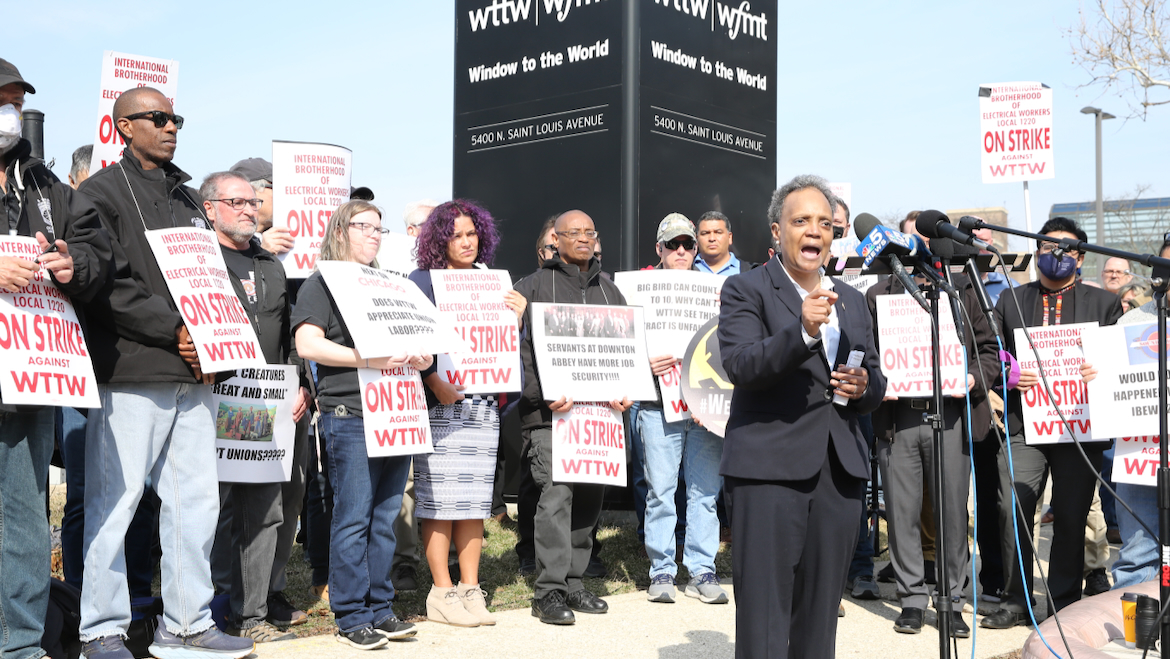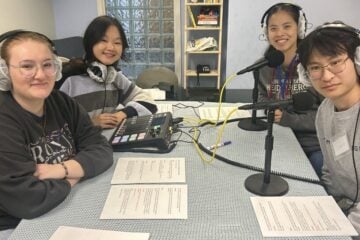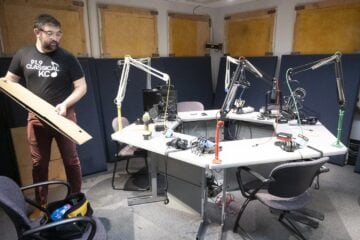WTTW strike ends as union technicians approve new contract

Tim Boyd / IBEW Local Union 1220
Chicago Mayor Lori Lightfoot speaks during an IBEW protest outside WTTW's building March 21.
The union representing broadcast technicians at WTTW in Chicago ratified a new collective bargaining contract Friday that guarantees new hires for their unit over the next three years but gives the station more freedom in hiring part-time employees and using nonunion labor for video work, among other concessions.
In a release Thursday, the union said the agreement will “partially protect” the size of the bargaining unit. WTTW has promised to hire five full-time technicians over the contract’s three-year term, according to Brett Lyons, business representative for Local Union 1220 of the International Brotherhood of Electrical Workers.
The bargaining unit could lose at least three members in the next fiscal year due to employees retiring, according to Local 1220 Business Manager John Rizzo. WTTW guaranteed to hire only two unit employees within that fiscal year, Rizzo said.
The contract also stipulates a 3% pay increase upon ratification with a 2.5% increase each year until the end of the contract.
“We wish we could have got a lot more,” Rizzo said. “This was the best deal we could attain with the company. And it’s a fair deal. There were a lot of sacrifices on our part, but … we see it as a victory.”
“The terms of our new contract, effective today, embrace change and new ways of working, are critical to our collective and continued success, will protect and create jobs, and are in line with the contracts of other media companies across the city and the country,” a WTTW spokesperson said in an email to Current Thursday.
Local 1220 represents 23 workers at the PBS station, including technicians, graphic artists and floor crew members. Union members returned to work Friday following a 23-day strike, which the union said was the first in the station’s nearly 70-year history.
Workers alleged that station management had threatened their work jurisdiction and tried to hire nonunion labor. The union had filed four grievances related to work jurisdiction over the last four years that advanced to arbitration, with arbitrators ruling in the union’s favor in each case.
Among the concessions the union made to management, the new contract allows the station to hire up to one part-time employee each week per job classification, including floor crew, technicians, maintenance and graphic artists. Part-time news employees are limited to working 32 hours per week, but that restriction does not apply to documentary or non-news production employees scheduled for multiple weeks.
“It’s a yes-and-no situation for me,” Juan Carranza, a system engineer at WTTW, said of the new contract. “I would have liked more stability, more full-time hires versus part-time.”
According to the union, WTTW management had also aimed to reduce the geographic area within which only union employees can shoot video for the station. Management wanted to reduce the current 200-mile radius around WTTW’s transmitter in downtown Chicago to 60 miles.
The new agreement keeps the 200-mile radius for documentary video but adopts an 80-mile radius for news footage, Rizzo said. Most video shot by union employees is news, he added.
Michele Strotman, a union member and technical director at WTTW, said that she accepts that compromise but expressed disappointment with the contract.
“We gave up a lot, and they gave up a little,” Strotman said. “It just basically got to the point where we knew that it was the best that we were going to get.”
A major victory, Strotman said, was securing the ability to donate sick leave to other union members who have used all of their own leave. In some cases, she said, she had received three days off for deaths in the family but had already used all of her time off allowed by the Family Leave and Medical Act.
The new agreement also allows WTTW to use video from government agencies, Chicago Public Schools and the city’s police and fire departments, Rizzo said. Producers and reporters who are not IBEW members will be able to shoot video for the station, but no more than 10 minutes a month total can air on television, he said. The union also agreed that WTTW programs can air solicited video from viewers only if it appears during credits, he added.
The union also agreed to allow the station to begin farming out color correction and special audio-effects work to third parties, limited to four full programs per year.
“That’s a pretty big giveback for us,” Rizzo said. “But we managed to put some fences around things where we felt comfortable that we wouldn’t lose jobs.”






